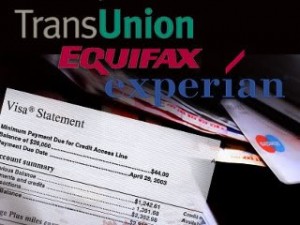Posts Tagged ‘credit score’
Posted on: February 22nd, 2011 by Amy Bolger
 What do you need to do to get your credit score in the highest range possible? Before you make any changes, you need to know the most important information used from your credit report in determining your score. Here are the two things that account for two-thirds of your credit score: What do you need to do to get your credit score in the highest range possible? Before you make any changes, you need to know the most important information used from your credit report in determining your score. Here are the two things that account for two-thirds of your credit score:
Your payment history: Having a long history of making payments on time on all types of credit accounts is one of the most important items lenders consider before approving you for a loan.
Owed versus available credit: This compares the amount you owe versus the total amount of credit available. Your credit score can be lower when you use more than 50 percent of your available credit for each account. The simple reason – when you are close to maxing out on all of your credit limits, lenders see you as a higher risk and more likely to make late payments in the near future.
There are, however, three other factors that account for about a third of your credit score:
Length of credit history: In general, a credit report containing a list of accounts opened for at least 10 years or more will help your credit score. The score considers your oldest active account and the average age of all accounts.
New credit: Opening several new credit accounts in a short period of time can lower your credit score. Also, multiple credit report inquiries may be seen as risky credit behavior on the near horizon, and can therefore lower your credit score.
Type of credit you use: Your mix of credit cards, retail accounts, finance company loans, and mortgage loans is considered.
Your credit score ignores your age, salary, and occupation. It also does not take into account financial gifts, support you receive, or your financial assets. For this reason, credit scores are less important for borrowers who seek loans that take these factors into account.
About 13 percent of people have credit scores of 800 or higher. If you look at their credit profile, they have:
• four to six credit card accounts
• no late payments in the past seven years
• at least one installment loan – a mortgage or a car loan (with excellent payment history)
• an average of 10 years credit history per account and a few accounts with 20 years of good history
• a low number of credit inquiries (fewer than three in the past six months)
• no bankruptcies, foreclosures, charge-offs or collections
• debt levels at no more than 35 percent of their overall credit limits per account

Tags: credit history, credit profile, credit report inquiries, credit score, credit scores, linkedin, mortgage loans, twitter
Posted in Financial Planning Rockville |
No Comments »
Posted on: December 30th, 2010 by Amy Bolger
 With lenders still especially skittish about making new loans, credit bureaus and others are offering services that help banks probe into your financial skeletons. The new offerings include ways to look at your rent and utility payments, figure out your income, gauge your home’s value and even rate your banking habits based on details like whether your direct deposits have stopped. With lenders still especially skittish about making new loans, credit bureaus and others are offering services that help banks probe into your financial skeletons. The new offerings include ways to look at your rent and utility payments, figure out your income, gauge your home’s value and even rate your banking habits based on details like whether your direct deposits have stopped.
When applying for a loan, your credit record still matters, of course, but here are some newer ways lenders and financial-services companies are sizing up your financial behavior and credit-worthiness:
Bank-Depositor Behavior Scores
Fair Isaac, the creator of the widely used FICO credit score, is marketing bank-depositor behavior scores, which are used by banks to assess their own customers. The scores are based on balances, deposit records, and withdrawal activity. Unlike credit scores, which are most affected after payments are late or credit is maxed out, behavior scores can be a leading indicator of credit risk. They also can help banks identify which of their customers might be ripe for additional services and rewards programs and which might need special attention because, for instance, their direct deposits had stopped.
Income Estimation
The bureaus are able to use credit-record information, such as the size of your credit lines and the age and size of your mortgage, and plug it into models to predict your earnings. Those estimates also may be used to double-check the income you report on credit applications or to determine if you should be preapproved for credit. You can’t see those estimates. But if you are denied credit because of them, you must be given a chance to provide additional information.
Rent Payments
Experian, one of the three major credit bureaus, bought RentBureau, which collects rental-payment data from large property managers and expects to integrate that information into credit records before the end of the year. Even if those consumers don’t want credit, that information could help them win better rates from insurers, which may use insurance scores based on credit records, and fatten up thin credit files, which some employers check before making hiring decisions.
Collection Triggers
If you owe money, you can run, but you can’t hide. Credit bureaus can now send daily reports to collection companies when a debtor’s financial status changes—say, if new employment information appears or if a debt starts to decline. A drop in credit use would indicate that the consumer has more capacity to pay and a better chance of repaying other outstanding debts.
Home Values
As home values have plummeted and foreclosures have soared in many states, all lenders have become more cautious. Using home values as a factor in credit decisions doesn’t appear to be widespread, but it may come into play. Of course, it also could work in your favor if you are one of the roughly 25 million Americans who owns a home outright.
Your Wealth
Information about your assets other than homes and cars, which aren’t part of the credit record, may soon play a bigger role in your financial life. With a better sense of a consumer’s balance sheet, lenders might be able to target potential customers better and also have a fuller sense of their likely risk. Equifax, another of the big three credit bureaus, offers financial-service providers an estimate of liquid wealth as part of a financial “suite” of information.
As all of these tools become more widespread, those are careful in all aspects of their financial lives may be rewarded, while those who are irresponsible, may face further penalties.

Tags: credit applications, credit score, credit scores, credit worthiness, fair isaac, linkedin, major credit bureaus
Posted in Financial Planning Rockville |
No Comments »
Posted on: December 23rd, 2010 by Amy Bolger
 It has been all over the news this year: Americans have really struggled to keep their credit under control. Earlier this year, FICO, the company responsible for the credit scoring system, said 25.5% of Americans had sub-par scores of 600 or below, and the latest data from the Federal Reserve indicate consumer credit card debt increased by $6.5 billion in the third quarter of 2010. Despite this, there are a few steps you can take to start 2011 off on the right foot, credit-wise. It has been all over the news this year: Americans have really struggled to keep their credit under control. Earlier this year, FICO, the company responsible for the credit scoring system, said 25.5% of Americans had sub-par scores of 600 or below, and the latest data from the Federal Reserve indicate consumer credit card debt increased by $6.5 billion in the third quarter of 2010. Despite this, there are a few steps you can take to start 2011 off on the right foot, credit-wise.
Run your credit report- Consumers are eligible to receive one free credit report annually, as part of the Fair Credit Reporting Act, so if you haven’t taken the government up on this offer, then now’s the time to do it. You can get a free credit report from any of the three major reporting agencies at AnnualCreditReport.com.
Pay off holiday debts before New Year’s Eve- Any debt you carry into 2011 is going to be quite costly, as interest rates currently remain pretty high, at around 14.7%. Consider paying off your December credit card bill as soon as possible, even if it is before the bill arrives in the mail.
Don’t close the store cards you opened up during the holiday season- Saving 10% to 15% off when buying presents in bulk may entice many consumers to open store credit cards, despite their apparent drawbacks and the fact that a large number of credit inquiries can actually drop your credit score. However, closing these accounts once you’ve paid off your balance won’t repair any damage done over the holidays. If anything, it will lower your score even more since terminating an account right after it was opened tells FICO that you couldn’t afford the credit line to begin with. Keep the card and use it responsibly, only charging up to about 10% of the credit limit.
Review the fine print on your credit card contract- The Credit Card Accountability Responsibility and Disclosure (CARD) Act of 2009 provides consumers with many protections they didn’t have before, but it’s far from being an iron-clad piece of legislation. For example, the CARD Act doesn’t prohibit credit card issuers from raising interest rates; it just makes it a little more difficult for them to do so. It also doesn’t require any notice if your credit card issuer has lowered your credit limit or closed your card.
Protect your identity- People should be on high alert for during the holiday season, but, it’s actually right after New Year’s that cyber-criminal come out of the woodwork. You will be receiving your 1099s, bank statements, and important tax documents in the mail come January, all of which have your name, address, and Social Security number on them. Make sure you keep a watchful eye out.

Tags: credit card debt, credit score, fair credit reporting act, free credit report, linkedin, twitter
Posted in Financial Planning Rockville |
No Comments »
Posted on: June 8th, 2010 by Amy Bolger
 For the amount of financial advice that we find in books, magazines, and online, we still tend to make a lot of mistakes when it comes to our money. Some of these mistakes might not cost us huge sums, but others can cost us a small fortune. Even the small mistakes, multiplied over a lifetime, can add up to an enormous sum. For the amount of financial advice that we find in books, magazines, and online, we still tend to make a lot of mistakes when it comes to our money. Some of these mistakes might not cost us huge sums, but others can cost us a small fortune. Even the small mistakes, multiplied over a lifetime, can add up to an enormous sum.
One of the big things is mutual funds. Do you actually know how much you pay for the funds in your retirement account? Mutual fund companies don’t send out monthly or quarterly bills. Instead, they quietly deduct their fees from the returns on your investments. These fees can add up to thousands of dollars over a lifetime of investing. To see how much you are really paying, use a free service use a free service such as Morningstar.com to track the actual expense of your funds and ETFs.
Errors in your way of thinking can cause problems as well. Don’t equate monthly payments with affordability. Too many people decide whether they can afford something based on whether they can manage the monthly payment. This is particularly true for homes and cars. Just because you can handle a payment does not mean you can truly afford the item. Monthly payments ignore the true cost of ownership. A car, for example, also requires insurance, gas, repairs, and maintenance. Instead of focusing on the monthly payment, separate needs from wants and evaluate how you might better use the money. If you have consumer debt, for example, consider paying off the debt before buying something that will commit you to future monthly payments for years to come.
If you can reduce your mortgage payments, do it. Reducing a mortgage by even 1% can result in substantial savings. Whether it’s due to falling mortgage rates, which are at historic lows, or an improved credit score, you may be able to save thousands of dollars of the life of your home loan by refinancing. Even if you have a low rate now, you should look into the current mortgage rates to see if you can do better. That 1% savings may justify refinancing over the life of the loan.
A lot of people miss the great deals they can find online. You can find deals, coupons, and promo codes on just about everything. Also, many retailers offer additional discounts if you buy online. Shopping online is often more convenient than going to malls or stores and having to wait in lines. Before you set out on your next shopping trip, check online and see what coupons or deals are available for the products you are looking for. The deals could be substantial.
Now that we are post tax season, pending you didn’t file an extension, you should take the time to scan over your return. If you got a rather large refund, it’s simply the result of you having too many withholdings taken out of your check. Letting the government hang on to the money for a year until it comes time to file again gives the government an interest free loan. Instead, ask your employer for new W-4 forms and adjust your withholdings so you can pocket more of your paycheck now.
Finally, don’t mislead yourself into thinking that making the minimum payments on credit cards will get you out of debt. Even low interest rate credit cards charge a high interest rate. Just making the minimum payments will add a lot of interest to your total payments over the life of that debt. Rather than making just the minimum payment, commit to paying more than the minimum, even if by just a few dollars. This will help pay off your debt much faster.

Tags: consumer debt, credit score, financial advice, mortgage payments, mutual funds, retirement account
Posted in Financial Planning Rockville |
No Comments »
Posted on: May 19th, 2010 by Amy Bolger
 So you’ve paid off all of your debts and climbed out of the financial hole, now what? Rebuilding your credit is a great next goal for you. Anyone who has the strength of character, patience, and commitment to climb out of debt should have no problem tackling a low credit score once you have guidelines. I’m sure your road to being debt free was a long one, so don’t expect the rebuild to be quick either. So you’ve paid off all of your debts and climbed out of the financial hole, now what? Rebuilding your credit is a great next goal for you. Anyone who has the strength of character, patience, and commitment to climb out of debt should have no problem tackling a low credit score once you have guidelines. I’m sure your road to being debt free was a long one, so don’t expect the rebuild to be quick either.
Free help is available to assist you in improving your credit. MyFICO.com, operated by the credit score companies themselves will provide a lot of great information, as well as the opportunity to blog with others who are on the same path as you, just further along. FICO monitors these blogs for offensive content, but does not interfere with any decent posting a person wants to make. I don’t know of too many companies that allow unrestricted comments about their product on their website for public viewing and comment. Another great resource is Credit Repair Kit for Dummies, by Stephen Bucci. You can probably find a copy a your local library. This book will help you put your credit score in context and give you the inside scoop on how they work and what you can do to help yourself.
Repairing your credit is a great way to begin planning for your future. When you decide it’s time to purchase a home or apply for a loan, be sure you check your credit reports first. You don’t want to have inaccurate negative information on your reports sabotaging your hard work improving your credit. And in the future, remember how hard it was to get out of debt and make a financial plan for yourself to stay that way.

Tags: credit repair kit, credit score, debts, improving your credit, repairing your credit
Posted in Financial Planning Rockville |
No Comments »
|
|
 What do you need to do to get your credit score in the highest range possible? Before you make any changes, you need to know the most important information used from your credit report in determining your score. Here are the two things that account for two-thirds of your credit score:
What do you need to do to get your credit score in the highest range possible? Before you make any changes, you need to know the most important information used from your credit report in determining your score. Here are the two things that account for two-thirds of your credit score:




